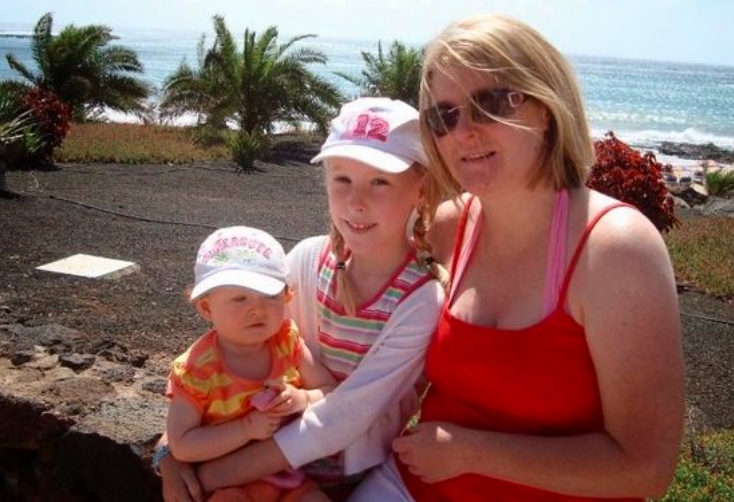A Glasgow mum who suffers from a rare brain tumour has lost her recent memories and thinks her grown-up daughters are still children. Gillian Wilson, 54, was diagnosed with a craniopharyngioma brain tumour in 2010 and underwent several surgeries and radiotherapy to remove it. However, the treatment caused complications that affected her short-term memory and left her ‘stuck in 2012’.
The diagnosis that changed her life
Gillian Wilson was a healthy and active mother of two when she started experiencing headaches, dizziness and forgetfulness in 2010. She visited her GP who told her she had stress-induced migraines and prescribed her painkillers. However, one day in May 2010, she felt an unbearable pain in her head and went to an optician for an eye test. The optician noticed something abnormal and referred her to the Southern General Hospital in Glasgow for an MRI scan. There, she was shocked to learn that she had a mass behind her pituitary gland, which turned out to be a craniopharyngioma brain tumour.
Craniopharyngiomas are rare and benign tumours that develop from cells near the pituitary gland, which regulates the body’s hormones. They can cause various symptoms such as headaches, vision problems, hormonal imbalances, obesity and diabetes. They can also affect the memory and cognitive functions of the patients. According to Brain Tumour Research, craniopharyngiomas account for only 2-5% of all primary brain tumours and affect about one in a million people.
The treatment that failed her memory
Gillian underwent surgery to remove most of the tumour, but it soon grew back and filled with fluid. She needed a shunt, a device that drains the excess fluid from the brain, to be fitted in her head. However, the shunt failed in 2012 and she had to undergo more operations and radiotherapy to try to control the tumour. The treatment, however, damaged her brain and caused her to lose her short-term memory. She also developed other health problems such as diabetes, osteoporosis, high blood pressure and chronic fatigue.

Gillian’s memory is now stuck in 2012, the year when her shunt failed. She does not remember anything that happened after that year and thinks her daughters, Alisha, 25, and Abbie, 15, are still young children. She often calls them to ask where they are or to pick them up from school. She also thinks she still works as a nursery nurse, even though she had to quit her job because of her condition. She sometimes confuses dreams and reality and does not recognise her own reflection in the mirror.
The family that supports her
Gillian’s daughters, Alisha and Abbie, have been taking care of their mum since her diagnosis. They help her with daily tasks such as cooking, cleaning, shopping and taking her medication. They also try to remind her of the present and show her photos and videos of their recent events. They say their mum is still the same person they love, but they miss having normal conversations with her and sharing their lives with her.
Alisha, who works as a support worker for people with learning disabilities, said: “Mum’s gone back to remembering times before her diagnosis. Her memory is regressing. She remembers when my sister, Abbie, and I were little kids, as if we were living back in 2012. She still refers to Abbie, who is now 15, as the wain. I’ll get a phone call from her asking me where I am when I’m in my own home; she will call to say she’s coming to pick me up from school, but I’m 25 and I don’t go to school anymore. Sometimes she will tell me that she’s heading off to work but she hasn’t worked for years because of her brain tumour. She’s often more confused when she’s woken up from a nap, so she thinks she’s still dreaming. Dreams and fantasy have become reality for mum.”
Abbie, who is studying for her National 5 exams, said: “It’s hard to see mum like this. She doesn’t remember anything new and she repeats herself a lot. She doesn’t know what I’m doing at school or what I want to do in the future. She doesn’t know that I have a boyfriend or that I like to play guitar. She doesn’t know that I’m growing up and becoming a young woman. I love her so much and I wish she could remember me as I am now.”
The hope that keeps them going
Despite the challenges they face, Gillian and her daughters are not giving up hope. They are raising funds and awareness for Brain Tumour Research, a charity that supports research into finding a cure for brain tumours. They are also grateful for the support they receive from their family, friends and neighbours, who help them cope with their situation.
Gillian said: “I don’t remember much of what’s going on, but I know I have a brain tumour and I know I have two beautiful daughters who look after me. They are my angels and I’m so proud of them. They are my reason to live and to fight this tumour. I hope one day there will be a cure for this and I hope I can get my memory back. I want to see my daughters grow up and be happy. I want to be there for them and share their joys and sorrows. I want to be their mum again.”
Alisha said: “We are doing our best to support mum and each other. We are also trying to raise awareness and funds for Brain Tumour Research, because we believe that research is the only way to find a cure for this horrible disease. We hope that by sharing our story, we can help other people who are going through the same thing and inspire them to keep fighting. We also hope that one day, mum will be able to remember us and our lives together. We love her more than anything and we will never give up on her.”


















